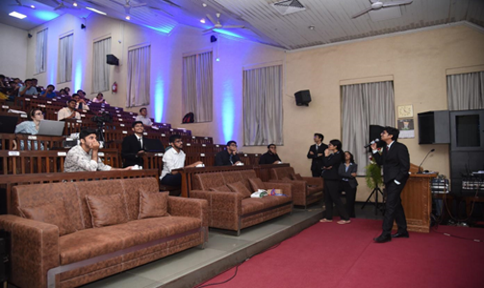Impact of “Aegeus” - A Novel Research-Based Quiz for and by the Medical Undergraduate Students in India
DOI:
https://doi.org/10.5195/ijms.2024.2656Keywords:
Biomedical Research, Quiz, Incentive-based strategy, Research Quiz, Undergraduate Medical Education, Biostatistics, Study Design, Ethics in Medicine, Peer-Assisted Learning, Intercollegiate Competition, Medical Research Concepts, Quiz-Based LearningAbstract
“Aegeus” is India’s first undergraduate research-based quiz, conceptualized and organized by medical students under the A.S.P.I.R.E council of Seth GS Medical College, Mumbai, as part of the annual “Confluence” conference. Launched in 2021, the quiz evolved from an online format during the pandemic to an in-person event over three years, incorporating innovative rounds on ethics, biostatistics, study design, and manuscript writing. With 125 teams (250 participants) across its editions, “Aegeus” fostered research interest and deeper understanding among undergraduates, with 73% of non-participants reporting increased motivation to engage in research. By refining its format annually based on participant feedback, the quiz enhanced engagement, competitiveness, and practical application of research concepts, paving the way for broader national and international participation in future editions.
References
Ghosh K, Ghosh K. Medical Research In Medical College In India: Current Scenario And Ways To Improve It. J Assoc Physicians India. 2019;67(4):71–3.
Dengri C, Gill A, Chopra J, Dengri C, Koritala T, Khedr A, et al. A Review Of The Quiz, As A New Dimension In Medical Education. Cureus. 2021;13(10):e18854.
Mulkalwar A, Krishnani O, Rao S, Tripathi R. A.S.P.I.R.E: A Student Led Initiative To Foster A Facilitative Environment For Undergraduate Medical Research. Perspectives in Clinical Research. 2022;13(2):65.

Published
How to Cite
License
Copyright (c) 2024 Shirish Rao, Devansh Lalwani, Amey Ambike, Yashika Zadage

This work is licensed under a Creative Commons Attribution 4.0 International License.
Authors who publish with this journal agree to the following terms:
- The Author retains copyright in the Work, where the term “Work” shall include all digital objects that may result in subsequent electronic publication or distribution.
- Upon acceptance of the Work, the author shall grant to the Publisher the right of first publication of the Work.
- The Author shall grant to the Publisher and its agents the nonexclusive perpetual right and license to publish, archive, and make accessible the Work in whole or in part in all forms of media now or hereafter known under a Creative Commons Attribution 4.0 International License or its equivalent, which, for the avoidance of doubt, allows others to copy, distribute, and transmit the Work under the following conditions:
- Attribution—other users must attribute the Work in the manner specified by the author as indicated on the journal Web site; with the understanding that the above condition can be waived with permission from the Author and that where the Work or any of its elements is in the public domain under applicable law, that status is in no way affected by the license.
- The Author is able to enter into separate, additional contractual arrangements for the nonexclusive distribution of the journal's published version of the Work (e.g., post it to an institutional repository or publish it in a book), as long as there is provided in the document an acknowledgment of its initial publication in this journal.
- Authors are permitted and encouraged to post online a prepublication manuscript (but not the Publisher’s final formatted PDF version of the Work) in institutional repositories or on their Websites prior to and during the submission process, as it can lead to productive exchanges, as well as earlier and greater citation of published work. Any such posting made before acceptance and publication of the Work shall be updated upon publication to include a reference to the Publisher-assigned DOI (Digital Object Identifier) and a link to the online abstract for the final published Work in the Journal.
- Upon Publisher’s request, the Author agrees to furnish promptly to Publisher, at the Author’s own expense, written evidence of the permissions, licenses, and consents for use of third-party material included within the Work, except as determined by Publisher to be covered by the principles of Fair Use.
- The Author represents and warrants that:
- the Work is the Author’s original work;
- the Author has not transferred, and will not transfer, exclusive rights in the Work to any third party;
- the Work is not pending review or under consideration by another publisher;
- the Work has not previously been published;
- the Work contains no misrepresentation or infringement of the Work or property of other authors or third parties; and
- the Work contains no libel, invasion of privacy, or other unlawful matter.
- The Author agrees to indemnify and hold Publisher harmless from the Author’s breach of the representations and warranties contained in Paragraph 6 above, as well as any claim or proceeding relating to Publisher’s use and publication of any content contained in the Work, including third-party content.
Enforcement of copyright
The IJMS takes the protection of copyright very seriously.
If the IJMS discovers that you have used its copyright materials in contravention of the license above, the IJMS may bring legal proceedings against you seeking reparation and an injunction to stop you using those materials. You could also be ordered to pay legal costs.
If you become aware of any use of the IJMS' copyright materials that contravenes or may contravene the license above, please report this by email to contact@ijms.org
Infringing material
If you become aware of any material on the website that you believe infringes your or any other person's copyright, please report this by email to contact@ijms.org







